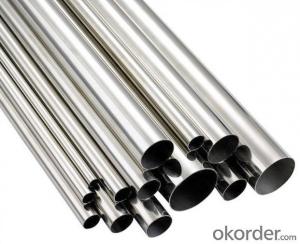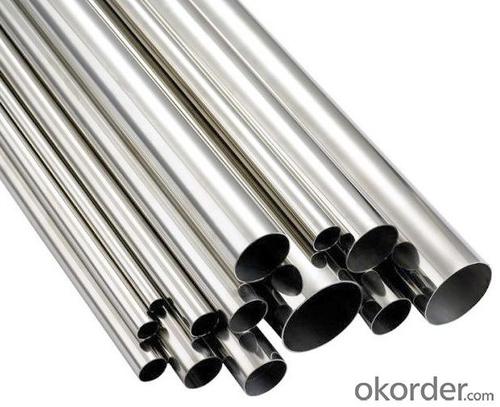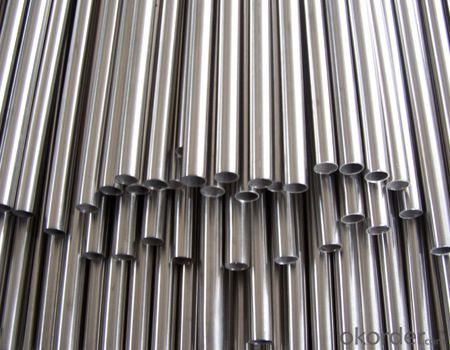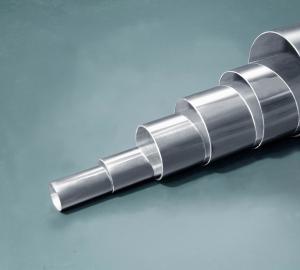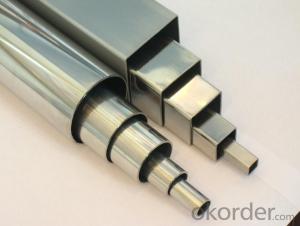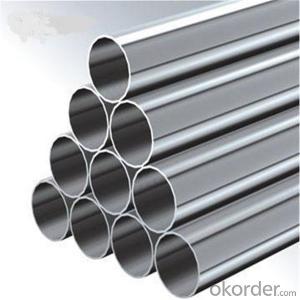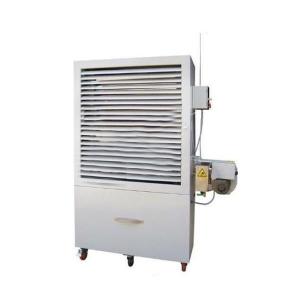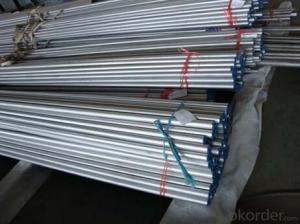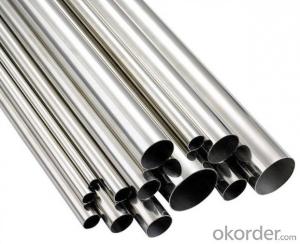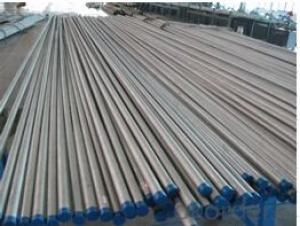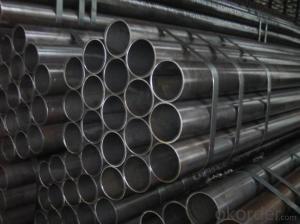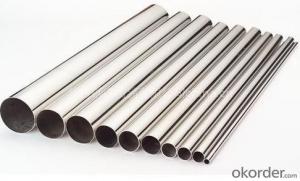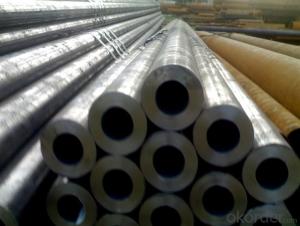Boiler Heat Exchanger Stainless Steel Pipe
- Loading Port:
- Tianjin
- Payment Terms:
- TT or LC
- Min Order Qty:
- 25 m.t.
- Supply Capability:
- 10000 m.t./month
OKorder Service Pledge
OKorder Financial Service
You Might Also Like
Product Description:
1、Structure of Boiler Heat Exchange stainless steel pipe 2507 ASTM A213 Description:
Boiler Heat Exchange stainless steel pipe is often used in the heating system. Heating system, or those stored energy (such as solar energy) in the form of heat, need to be built with the material that can withstand temperatures up to 550 degrees Celsius. High chromium molybdenum welded steel pipe can work in the extreme, which maintain as the ideal material for the construction of power station.
2、Main Features of Boiler Heat Exchange stainless steel pipe 2507 ASTM A213:
• High manufacturing accuracy
• High strength
• Small inertia resistance
• Strong heat dissipation ability
• Good visual effect
•Reasonable price
3、Boiler Heat Exchange stainless steel pipe 2507 ASTM A213 Images:
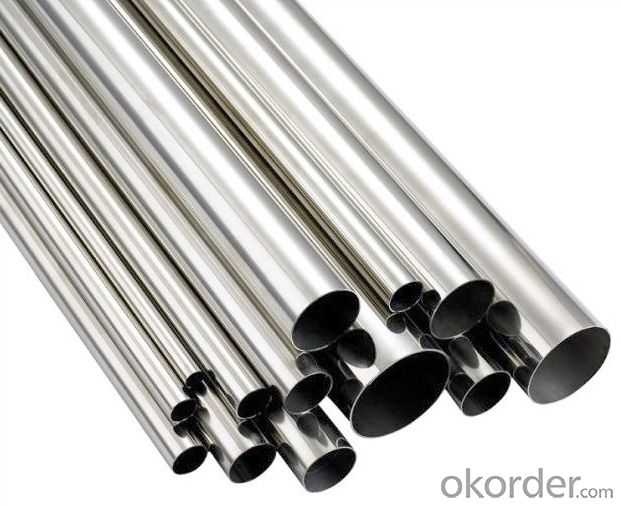
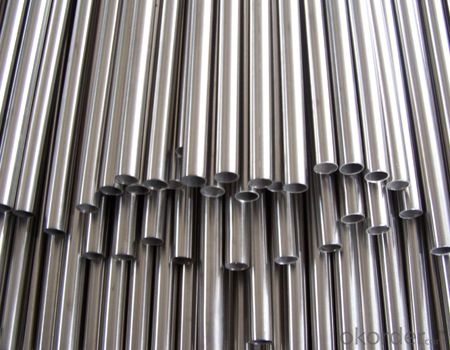
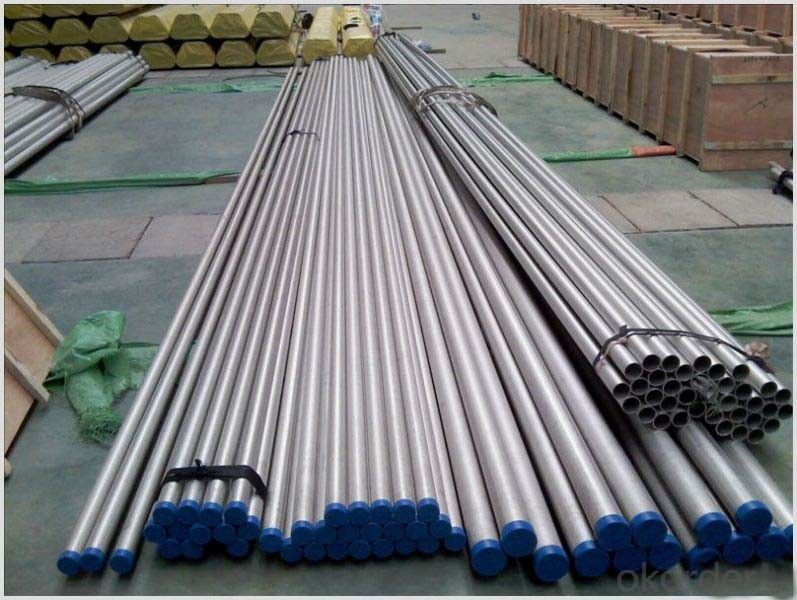
4、Boiler Heat Exchange stainless steel pipe 2507 ASTM A213 Specification:
1)Commodity: heat exchanger pipe
2))Material: 304,316L,304L,316,321,310S,etc
3)Thickness:0.5-100mm
4)Length: 1-14m
5、FAQ of Boiler Heat Exchange stainless steel pipe 2507 ASTM A213:
①How is the quality of your products?
Our products are manufactured strictly according to national and internaional standard, and we take a test on every pipe before delivered out. If you want see our quality certifications and all kinds of testing report, please just ask us for it.
Guaranteed: If products’ quality don’t accord to discription as we give or the promise before you place order, we promise 100% refund.
②How about price?
Yes, we are factory and be able to give you lowest price below market one, and we have a policy that “ for saving time and absolutely honest business attitude, we quote as lowest as possible for any customer, and discount can be given according to quantity”,if you like bargain and factory price is not low enough as you think, just don’t waste your time.Please trust the quotation we would give you, it is professional one.
③Why should you chose us?
Chose happens because of quality, then price, We can give you both.Additionally, we can also offer professional products inquiry, products knowledge train(for agents), smooth goods delivery, exellent customer solution proposals.Our service formula: good quality+good price+good service=customer’s trust
SGS test is available, customer inspection before shipping is welcome, third party inspection is no problem.
Any question, pls feel free to contact us !
- Q: Can stainless steel pipes be polished?
- Yes, stainless steel pipes can be polished. Stainless steel is a versatile and durable material that can be polished to enhance its appearance and provide a smoother finish. Polishing stainless steel pipes involves using abrasive materials, such as sandpaper or polishing compounds, to remove any imperfections, scratches, or oxidation from the surface. This process not only improves the aesthetic appeal of the pipes but also helps to maintain their corrosion resistance and prolong their lifespan. Polished stainless steel pipes are commonly used in various industries, including architecture, interior design, automotive, and food processing, where a clean and polished look is desired.
- Q: How do you prevent erosion in stainless steel pipes?
- One way to prevent erosion in stainless steel pipes is by applying protective coatings or linings to the interior surface of the pipes. These coatings act as a barrier, preventing direct contact between the corrosive fluids or materials and the stainless steel, thereby reducing the risk of erosion.
- Q: Can stainless steel pipes be used for exhaust systems?
- Yes, stainless steel pipes can be used for exhaust systems. They are commonly used due to their excellent corrosion resistance, high temperature tolerance, and durability. Stainless steel pipes can withstand the harsh conditions of exhaust gases and provide a long-lasting and efficient solution for exhaust systems.
- Q: What is the difference between 304 and 316 stainless steel pipes?
- Both 304 and 316 stainless steel pipes are widely used in various industries for their exceptional resistance to corrosion and durability. Although they may appear similar, there are significant distinctions between the two grades: 1. Composition: The main difference lies in their composition. 304 stainless steel pipes contain 18-20% chromium and 8-10.5% nickel, whereas 316 stainless steel pipes contain 16-18% chromium, 10-14% nickel, and 2-3% molybdenum. The additional molybdenum in 316 stainless steel enhances its resistance to corrosion, particularly against aggressive chemicals like chlorides. 2. Corrosion resistance: In terms of corrosion resistance, 316 stainless steel pipes surpass 304 stainless steel pipes, especially in environments with high chloride exposure, such as coastal areas or industrial settings with corrosive chemicals. The molybdenum content in 316 stainless steel offers enhanced protection against pitting and crevice corrosion. 3. Temperature resistance: Both grades of stainless steel pipes exhibit good resistance to high and low temperatures, but 316 stainless steel pipes perform better under extreme temperature conditions. They can withstand higher temperatures and retain their strength better compared to 304 stainless steel pipes. 4. Applications: Due to its superior resistance to corrosion, 316 stainless steel pipes are commonly used in industries such as marine, chemical processing, pharmaceuticals, and food processing. On the other hand, 304 stainless steel pipes find applications in various industries, including automotive, construction, and appliances. 5. Cost: Generally, 304 stainless steel pipes are more affordable than 316 stainless steel pipes due to differences in composition and availability. However, the cost-effectiveness of each grade should be determined based on the specific application and required corrosion resistance. In conclusion, while both 304 and 316 stainless steel pipes offer excellent corrosion resistance and durability, the addition of molybdenum in 316 stainless steel provides superior resistance to chloride corrosion. The choice between the two grades depends on the specific application, budget, and level of corrosion resistance required.
- Q: Is galvanized steel pipe stainless steel pipe?
- Not galvanized pipe, but the surface of the welded pipe galvanized zinc rust protection. The stainless steel pipe is welded by stainless steel band, or made of stainless steel bar punched (seamless pipe). And the two prices are very different
- Q: Can stainless steel pipes be used for drinking water systems?
- Yes, stainless steel pipes can be used for drinking water systems. Stainless steel is a highly durable and corrosion-resistant material, making it suitable for use in plumbing systems. It is also non-reactive, which means it does not leach harmful chemicals into the water. Additionally, stainless steel pipes are easy to clean and maintain, reducing the risk of bacterial growth and ensuring the safety and quality of the drinking water.
- Q: What are the different types of stainless steel pipe finishes?
- There are several different types of stainless steel pipe finishes, each providing a unique appearance and level of corrosion resistance. 1. Mill Finish: This is the standard finish for stainless steel pipes straight from the mill. It has a dull and non-reflective surface, making it suitable for applications where aesthetics are not a priority. 2. Brushed Finish: Also known as satin finish, this type of finish is achieved by brushing the surface of the stainless steel pipe with a fine abrasive material. It creates a consistent linear grain pattern, giving the pipe a smooth and elegant appearance. 3. Mirror Finish: This finish is achieved by polishing the stainless steel pipe to a highly reflective surface. It is commonly used in decorative applications, such as handrails and architectural elements, where a shiny and aesthetically-pleasing appearance is desired. 4. Polished Finish: Similar to mirror finish, polished finish involves buffing the surface of the stainless steel pipe to a high shine. However, it does not achieve the same level of reflection as mirror finish, making it more suitable for industrial or commercial applications. 5. Satin Finish: Satin finish is a type of brushed finish with a low sheen and smooth texture. It provides a subtle, sophisticated appearance and is often used in applications where a matte finish is desired, such as in kitchen appliances or automotive parts. 6. Bead Blasted Finish: This finish is achieved by bombarding the surface of the stainless steel pipe with small glass beads at high pressure. It creates a uniform and non-directional texture, giving the pipe a matte, frosted appearance. Bead blasted finish is commonly used in architectural and decorative applications. Each of these stainless steel pipe finishes has its own advantages and is chosen based on the specific requirements of the application, such as aesthetics, corrosion resistance, and ease of maintenance.
- Q: How do you prevent stainless steel pipes from corroding?
- To prevent stainless steel pipes from corroding, there are several measures you can take: 1. Choose the right grade of stainless steel: Different grades of stainless steel have varying levels of corrosion resistance. It is important to select a grade that is suitable for the specific environment in which the pipes will be used. For more corrosive environments, higher grades such as 316 stainless steel are recommended. 2. Proper installation and maintenance: Ensure that the pipes are installed correctly, with appropriate gaskets, seals, and fittings to prevent any gaps or leaks that can allow moisture or corrosive substances to penetrate. Regularly inspect and maintain the pipes to identify and repair any damage or potential sources of corrosion. 3. Keep the pipes clean and dry: Regular cleaning of stainless steel pipes helps remove any contaminants or corrosive substances that may have accumulated. Avoid using harsh chemical cleaners that can damage the protective oxide layer on the surface of the stainless steel. Additionally, keeping the pipes dry by avoiding prolonged exposure to water or moisture can help prevent corrosion. 4. Apply protective coatings: Applying a protective coating or paint specifically designed for stainless steel can provide an additional layer of protection against corrosion. These coatings act as a barrier, preventing direct contact between the stainless steel and corrosive substances. 5. Cathodic protection: In certain cases where the pipes are exposed to highly corrosive environments, cathodic protection can be employed. This involves using sacrificial anodes or impressed current systems to protect the stainless steel from corrosion by diverting the electrical current away from the pipes. By following these preventive measures, you can significantly reduce the risk of corrosion in stainless steel pipes and prolong their lifespan.
- Q: Are stainless steel pipes resistant to UV radiation?
- Yes, stainless steel pipes are resistant to UV radiation. Stainless steel is known for its excellent corrosion resistance, and this includes resistance to the harmful effects of UV radiation. When exposed to UV radiation, stainless steel forms a passive oxide layer on the surface, which acts as a protective barrier against further damage. This oxide layer helps to prevent degradation, discoloration, and loss of mechanical properties that can occur when materials are exposed to UV radiation. Therefore, stainless steel pipes are a suitable choice for outdoor or exposed applications where they may be subjected to UV radiation.
- Q: Can stainless steel pipes be used in chemical processing plants?
- Stainless steel pipes are indeed suitable for use in chemical processing plants. Their outstanding corrosion resistance makes them a favored choice for piping systems within these facilities. Given that chemical processing plants frequently handle corrosive substances and operate under high temperatures, stainless steel pipes are well-equipped to withstand such challenging environments. They exhibit resistance to various chemicals, including acids, bases, and chlorides, which are commonly encountered in chemical processing plants. Furthermore, stainless steel's smooth interior surface reduces the likelihood of corrosion and facilitates effortless cleaning and maintenance. All in all, stainless steel pipes provide a dependable and long-lasting solution for transporting chemicals in chemical processing plants.
Send your message to us
Boiler Heat Exchanger Stainless Steel Pipe
- Loading Port:
- Tianjin
- Payment Terms:
- TT or LC
- Min Order Qty:
- 25 m.t.
- Supply Capability:
- 10000 m.t./month
OKorder Service Pledge
OKorder Financial Service
Similar products
Hot products
Hot Searches
Related keywords
